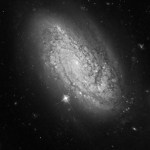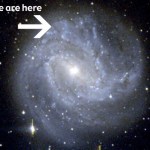newton
Dark matter - that invisible stuff that is supposed to make up some 20% of the Universe - was thought up to explain a puzzling observation. The amount of mass we can see through our telescopes is not enough to keep galaxies from spinning apart. The existence of great quantities of hidden mass would provide the gravitational pull needed to form those galaxies and enable them to rotate in the way that they do.
But not everyone is willing to buy the idea that the Universe is cloaked in "invisible cloth." An alternate theory, first put forward by Weizmann Institute astrophysicist Prof. Moti…
Galactic Binder (a Star Wars fan site) invited me to write an article for them. Obviously, I said "yes". But what to write about? I decided to write a different version of my flying R2-D2 post. What is different? In my original post, I go into a lot of details. Essentially, that post is like most of my other ones where I am thinking out loud. I used to work out the answer and then write the post, but I like it this way better.
Here is the Galactic Binder post:
Aristotle, Newton, and R2-D2
So, in this Galactic Binder post, I don't go into the details. Basically, I just use the flying…
Three posts in one day. And all of such high quality. You lucky people.
Pascal has a go at explaining the std.nutters. Some of it is the usual correct stuff, but some of it is wrong: What you need, over and above all that, is constant social interaction with other practising scientists. Oral tradition and daily exposure to other scientists' everyday decisions are indispensable. That sounds fairly plausible, doesn't it? Until you think of Newton. Or indeed, of Einstein.
This is great. Many people have already reported google's apple-dropping homepage in honor Newton's birthday. In case it disappears, here is a screen shot.
So, I got this awesome note from Dale Basler. He said that his class had analyzed this falling apple animation. What a very Dot Physics-y idea (check out his analysis). He said they were questioning the results which might be due screen capture issues. I decided to reproduce this.
I captured the motion with Apple's Quicktime X screen recording feature. I then used Tracker Video Analysis - which now has an autotracking feature that…
This comes up everytime I teach physics for elementary education majors. The curriculum I use (Physics for Everyday Thinking - which is awesome) says that the colors in white light are ROYGBV (Red-Orange-Yellow-Green-Blue-Violet). Typically, I will get a student that says "Hey! What about indigo? Shouldn't it be ROYGBIV?" My first reaction to this was "huh?" Really, does it matter? Here is the spectrum you would see looking at a white light source.
You could break this into as many or as few colors as you like. So, it doesn't really matter. But this leads to a great question: Who…
Just a quick note to dial up Ira Flatow's Science Friday show on NPR today at 3 pm EDT. Supporting information and the archived show can be found here.
Guy-who-I-would-kill-to-be, Tom Levenson, will be on with Ira to speak about his new book, Newton and the Counterfeiter: The Unknown Detective Career of the World's Greatest Scientist.
Here is also a link to other appearances Professor Levenson will be having related to the book.
For those of you who don't know Thomas Levenson, he is currently a Professor, Interim Program Head, and Director of the Graduate Program in Science Writing at the…
Just to be clear, Newton probably didn't have a portable video camera. I do. I have one of these Flip Mino pocket cameras. Very nice. You can put it in your pocket. However, there is a problem with cameras like these (think of video from camera phones). The problem is the mass, it is too small.
Video from a camera phone or small portable camera looks too jerky (unless you are careful). Sometimes it is jerky to the point that it makes me feel barfy. The reason this happens is that with a small mass, a force can cause a significant acceleration. Let me draw a picture (you know I like…
**Pre reqs:** [Free Body Diagrams](http://scienceblogs.com/dotphysics/2008/09/basics-free-body-diagrams.php), [Force](http://scienceblogs.com/dotphysics/2008/09/basics-what-is-a-force.php)
The time has come to look at things that are NOT in equilibrium. The most basic question to ask yourself is: *"What do forces do to an object"*? Aristotle would say that forces make things move. Constant forces make things move constantly. Actually, Aristotle said there were two types of motion:
Natural motions: These motions don't need anything to happen, they just do. Example: a rock falling. You…
(This is adapted from my public lecture, Afraid of the Dark: How We Know What We Can't See.)
Let's go back over 200 years ago, to 1781. William Herschel (left) discovered the planet Uranus, noticing that an object, as bright as a star, was actually moving relative to the other stars. The other five inner planets (besides Earth) were known for over 2000 years before that. But it was thought for a long time that Saturn was the farthest one.
But it clearly isn't; as you can see with modern telescopes, Uranus is a super-interesting planet, rotating on its side, surrounded by rings and moons.…
Can you believe that I had a fight today with someone who's been dead for over 350 years, and I'm losing? -- Ethan, yesterday
Of course you can believe it, when the man I'm fighting with is Johannes Kepler. I don't get a chance to tell you about my research very often, mostly because it's still a work in progress. But my latest paper was just submitted and is now out of the way, and so I'd like to tell you what I'm working on at the moment.
Well, there we are in the galaxy. We look up at the night sky, and we see our planets as well as all the stars that surround us. But you know what we don…



